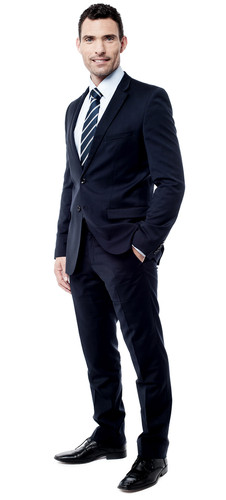Appearing before a judge and jury can be a stressful experience – especially if you have never been inside a courtroom before. Even if you have been to court, deciding how to make the best impression for your personal injury claim or criminal case can be complicated. One of the first and most important ways of making an impact is choosing the proper clothing for your courtroom appearance.
While it might not be the first issue to cross your mind, the manner in which you dress – from your shoes to your hairstyle – can influence a judge or jury. It may even end up playing a role in the outcome of your case.
Indeed, according to The Wall Street Journal, “there’s a place where first impressions are even more crucial than at a job interview or at a dinner with our future in-laws: the courtroom.”
Clothes Make the Man (or Woman) in the Courtroom
Many of us have heard the expression “the clothes make the man.” In the case of clothing in the courtroom, this statement might be truer than you would expect.
Why is it so important to address this topic? Given the strong ways in which your apparel can influence your case, it is extremely important to ensure that you are putting forth the sharpest image of yourself that you can. No matter how often we give advice about choosing your clothing and accessories to create the image of yourself that you want the court to see, plaintiffs and defendants alike continue to make unconsidered fashion choices that could end up tipping the scales against them.
The Wall Street Journal emphasizes that many issues are at play when a judge or jury begins determining the merits of a case. Apparel choices likely will be one of many factors involved in a case, whether you are in court over a personal injury law matter or on a DUI charge. Yet the fact that clothing comes into play at all should make any plaintiff or defendant take notice.
The WSJ article emphasizes how one judge “takes account of both the appearance the behavior of those who come before her court,” and “sloppy dress at trial might seem to add to the case against a father accused of neglectful child-rearing.” At the same time, clothing choices can swing in the other direction, as “a woman who is claiming poverty in a financial hearing might undermine her case if she’s wearing highly expensive clothing.”
What to Wear in Court in Goldsboro
Knowing that your choice of apparel may make a difference in the outcome of your case, what should you take into consideration when deciding how to dress for court? Several state court websites offer helpful advice for people preparing to go to court, whether they are appearing before a judge in a family law matter or as a defendant in a traffic matter.
According to N.C. Administrative Office of the Courts (AOC), you should avoid dressing too casually for court. The website suggests that you “dress for court as if you were going to work or church.” In other words, dress conservatively and wear properly fitted clothes. Also, keep in mind that many judges simply will not allow you to enter a courtroom if you are dressed inappropriately.
When it comes to clothing, men should consider wearing the following:

- Sports coat
- Long-sleeved button-down shirt with a collar
- Tie
- Long pants
- Belt.
Women should think about the following apparel items when preparing for court:

- Knee-length dress or conservative pantsuit
- Long pants and a conservative blouse
- Knee-length skirt and conservative blouse.
When it comes to accessories, both men and women should wear:
- Close-toed, conservative shoes
- Few, if any, jewelry items.
In terms of hygiene, consider the following:
- Scheduling a haircut shortly before your appearance in court
- Grooming yourself before the court appearance, which includes shaving
- Brushing your teeth
- Wearing deodorant
- Trimming and cleaning your fingernails
- Applying only a moderate amount of makeup
- Choosing clothing that covers your tattoos.
Dressing up for court is extremely important. You want to present an image of a polished, professional person who should be winning his or her case.
While your appearance might not actually have anything to do with the merits of your case, the instant members of a jury see you, they will make judgments about who you are based on the way you have decided to present yourself. As such, you should do everything you can to present yourself in the most favorable light.
What Not to Wear to Court
You should also think about what you should avoid wearing during your court appearance. The Massachusetts Court System provides a handful of tips for avoiding inappropriate clothing when you go before a judge or a jury. If you are scheduled to appear in court, do not wear any of the following:
- Shorts
- Halter tops
- Tube tops
- See-through blouses
- Any clothing that exposes your midriff
- Ripped jeans or pants
- Torn jeans or pants
- Baggy or sagging pants
- Hats
- Flip-flops or other open-toed shoes
- Sneakers or other athletic shoes
- Platform shoes
- Stiletto heels
- Clothing with inappropriate images or emblems
- Clothing that depicts or promotes any illegal acts
- Exercise clothing
- Clothing that is tightly fitted
- Sunglasses
- Too much jewelry.
Court Cases and Your Attire
Court cases clearly can be decided based on the appearance of a plaintiff or a defendant. You have control over your appearance. So, it is important to put forth a professional, tidy image.
According to an article in Psychology Today, dressing for the court is not just about winning over a judge or jury. The way you dress can also influence the way you behave in any given setting.
Remember: Not only are judges and juries looking at your appearance, but they are also taking into account your posture and your behavior. If you look at the part of a winning plaintiff or defendant, the judge or jury might make such an assumption, too.
Get Help from Our Goldsboro Attorneys
Are you preparing for a court appearance? One of our experienced Goldsboro attorneys can help. Contact Strickland Agner & Pittman today to learn more about our services.

